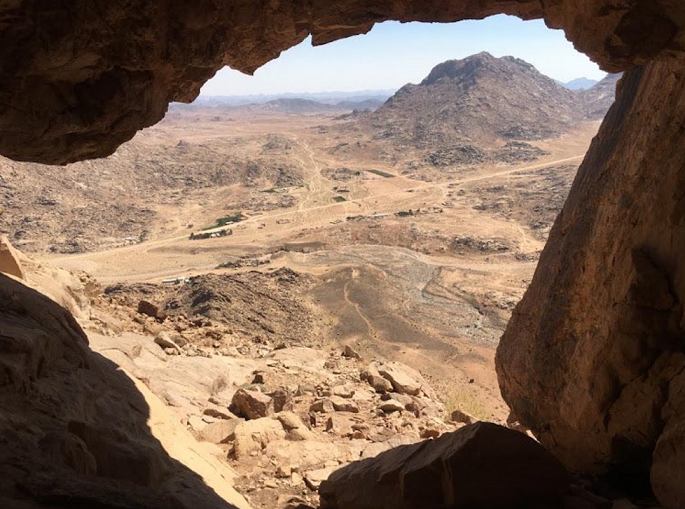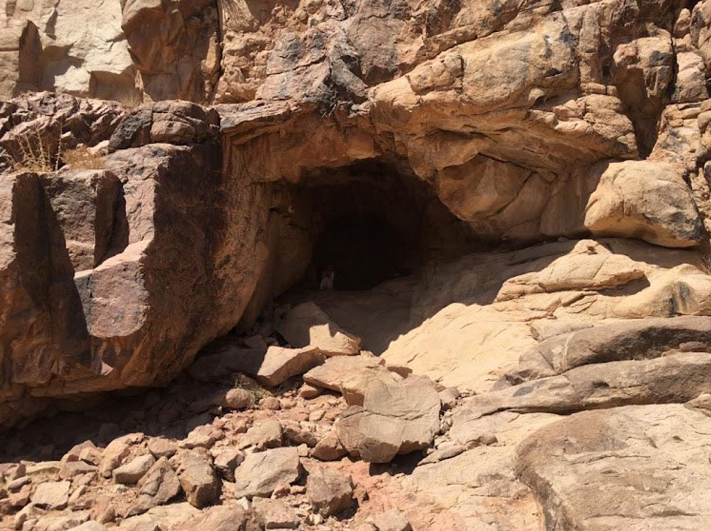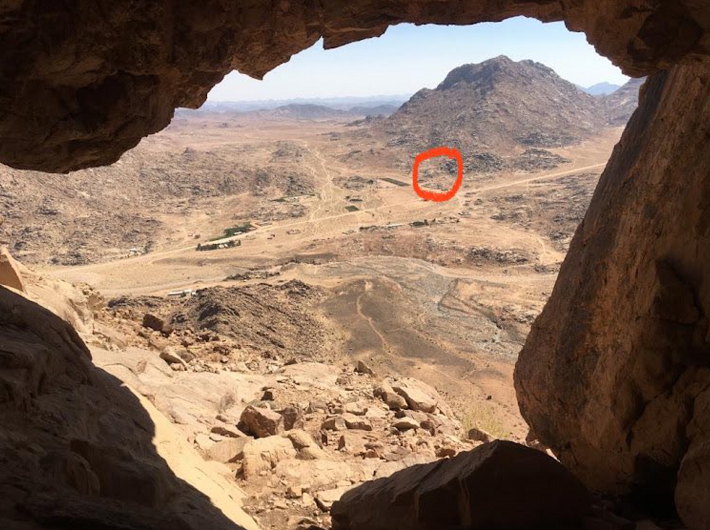This article is part of a series on Old Testament Christophanies. For important background information, see An Introduction to Old Testament Christophanies–with Justin Martyr.
Following his victory over Ahab and the 450 prophets of Baal on Mount Carmel, Elijah should have been feeling emboldened. However, in 1 Kings 19, Elijah found himself on the run from Jezebel. And he was feeling so depressed that he sat under a tree and asked the Lord to take his life (vv. 1–4). But instead of doing as Elijah asked, the Angel of the Lord came to comfort and provide for him:
He lay down and slept under a juniper tree; and behold, there was an angel touching him, and he said to him, “Arise, eat.” Then he looked and behold, there was at his head a bread cake baked on hot stones, and a jar of water. So he ate and drank and lay down again. The angel of the LORD came again a second time and touched him and said, “Arise, eat, because the journey is too great for you. ”So he arose and ate and drank, and went in the strength of that food forty days and forty nights to Horeb, the mountain of God (1 Kgs 19:5–7).
Yet again, the Angel of the Lord appeared under a tree. But instead of having food prepared for Him, as was the case with Abraham and Gideon, it was the Angel who prepared the food and drink.
Elijah was about to be sent to a very special place, one where the Lord had appeared before. The bread from the Angel gave Elijah the strength to travel for forty days and forty nights to Sinai (Horeb), the mountain of God (v. 8). The implication is that Elijah didn’t eat anything else until he reached the mountain. Remember, it was on Sinai where Moses twice went without food and water for forty days and nights while in the Lord’s presence (Exod 34:28; Deut 9:9). Elijah’s fast in the wilderness prefigured the forty days and nights Jesus fasted in the wilderness when He was tempted by the devil (Matt 4:1–2). The Son of God strengthened Elijah to fast as He later would.
The journey to Sinai should have only taken Elijah a few days. But he likely took an indirect route, traveling one day for each year the Israelites wandered in the wilderness. It was during their time wandering that the people had to rely on manna, bread from heaven. On at least two occasions, Jesus miraculously fed multitudes of people bread and fish.[1] After one of those occasions, Jesus reminded the people that their ancestors in the wilderness ate bread from heaven (John 6:31). At that time there was a common belief that the Messiah would cause the manna from heaven to return. The Apocalypse of Baruch (Syriac), a Jewish text written near the end of the first century AD, is representative of this belief:
And it shall come to pass when all is accomplished that was to come to pass in those parts, that the Messiah shall then begin to be revealed . . . And it shall come to pass at that self-same time that the treasury of manna shall again descend from on high . . .[2]
When Jesus miraculously provided the bread, He signaled that He was the Messiah. He also strongly implied that it was He who had provided the manna to the Israelites in the wilderness.
Jesus reminded the people about the bread from heaven as a lead into His famous declaration, “I am the bread of life; he who comes to Me will not hunger, and he who believes in Me will never thirst” (John 6:35). In contrast to the eternal life that comes from believing in Jesus, the people who ate manna in the wilderness died (John 6:47–49). The Son of God is the source of life. He fed the multitudes, their ancestors in the wilderness, and Elijah. And He sustained Moses and Elijah during their fasts.
Outside the Cave

Once Elijah completed his journey, he stayed in the cave on Sinai (v. 9). 1 Kings 19:9 is typically translated to read “a cave,” despite “the cave” being more accurate. A specific cave was apparently the author’s intent. The Talmud was likely correct in teaching that the cave Elijah stayed in was one in the same as the cleft Moses stood in when he beheld the Lord’s “back.”[3] The Son of God would soon visit Elijah at the same place where He had once visited Moses.
The “word of the LORD” came to Elijah and asked him what he was doing there (v. 9). The “word” is widely understood as a message from the Lord. But because the verse is framed by the divine Angel sending Elijah to Sinai and Yahweh passing by the prophet, it could be that the Lord also appeared in the cave as the Word. Instead of saying that the word came “to” Elijah, the Targum says that the word was “with” Elijah.[4] The change emphasizes a personal presence with the prophet.
Elijah answered the Lord, saying that he had been very zealous for Him, but the Israelites had forsaken the Lord’s covenant, torn down His altars, and killed His prophets. Elijah lamented that he alone was left and that the Israelites sought his life (v. 10). Then, the Lord told Elijah what to do:
So He said, “Go forth and stand on the mountain before the LORD.” And behold, the LORD was passing by! And a great and strong wind was rending the mountains and breaking in pieces the rocks before the LORD; but the LORD was not in the wind. And after the wind an earthquake, but the LORD was not in the earthquake. After the earthquake a fire, but the LORD was not in the fire; and after the fire a sound of a gentle blowing. When Elijah heard it, he wrapped his face in his mantle and went out and stood in the entrance of the cave. And behold, a voice came to him and said, “What are you doing here, Elijah?” (1 Kgs 19:11–13).
As the Lord passed by Sinai, He demonstrated some of His power and the fire of His glory, much like He did when He descended on Mount Sinai (Exod 19:18) and when He passed by the cleft of the rock Moses was in (Exod 33:22).
Since Yahweh is said not to be in the wind, in the earthquake, or in the fire, the implication is that He was in the gentle blowing. The Hebrew qol d’mamah daqqah, rendered in our version as “a sound of a gentle blowing,” may be translated numerous ways, including as “a still small voice” and as “a gentle whisper.” The Lord came in a gentler and far subtler way than Elijah may have expected. Even so, the prophet knew it was time to present Himself before the Lord. Out of a fear of death, Elijah wrapped his face to avoid looking upon the Lord. Moses hid his face for the same reason when God called to him from the burning bush (Exod 3:6). When the Lord passed by the cleft of the rock, He shielded Moses to prevent him from dying upon seeing God’s face (Exod 33:19–23). With his face hidden, a voice came to Elijah and spoke to him. The Targum says that the voice was “with” Elijah.[5] Although Elijah couldn’t see Him, Yahweh was nearby!
When the Lord earlier spoke to Elijah in the cave, He asked what Elijah was doing there. The Lord now asked again, and Elijah gave the same answer as before. Elijah had been very zealous for the Lord, but the Israelites had forsaken His covenant, torn down His altars and killed His prophets. Elijah again lamented that he alone was left and that the Israelites sought his life (v. 14). Now that the Lord had demonstrated some of His power and spoken to Elijah from the following calm, the prophet was made ready to receive God’s instructions. In verses 15–18, Elijah was ordered to go to the wilderness of Damascus and anoint Hazael as king of Syria. Elijah also had to anoint Jehu as king of Israel and Elisha as the prophet’s successor. The kings would execute the wicked Israelites.[6] The Lord promised that seven thousand would be left in Israel who hadn’t bowed to Baal or kissed him. The Lord’s words came to pass when Hazael and Jehu executed the Lord’s judgment (2 Kgs 10).
The point of the Christophany was that the Lord can appear or speak in less dramatic and even subtle ways. The Lord doesn’t always have to appear in a burning bush; He doesn’t have to descend in fire like on Sinai; nor, like earlier with Elijah, does He have to answer by sending fire down from heaven. His subtle appearance foreshadowed the Incarnation, when the Son of God would humble Himself as a man. As Isaiah prophesied, the Messiah would have no stately form or majestic appearance (Isa 53:2).
Elijah’s encounter with the Son of God on Sinai was much like Moses’, but different enough to be unique to the prophet. The Son visited Elijah at this special place to both reward him for his service and to prepare him for the missions to come.


[1] The feeding of the five thousand is recorded in Matthew 14:13–21; Mark 6:31–44; Luke 9:12–17; John 6:1–14. The feeding of the four thousand is recorded in Matthew 15:32–38; Mark 8:1–9.
[2] Apocalypse of Baruch (Syriac) 29:3, 8, in The Apocrypha and Pseudepigrapha of the Old Testament, vol. 2.
[3] b. Megillah 19b.
[4] Targum Jonathan to 1 Kings 19:9.
[5] Targum Jonathan to 1 Kings 19:13.
[6] It is said that Elisha would put wicked Israelites to death as well (v. 17). However, Elisha was a man of peace. His sword may be understood as a spiritual one, the word of the Lord.

Excellent article! The Christophanies are the most tender and amazing stories.
Thank you sister. They really are incredible!